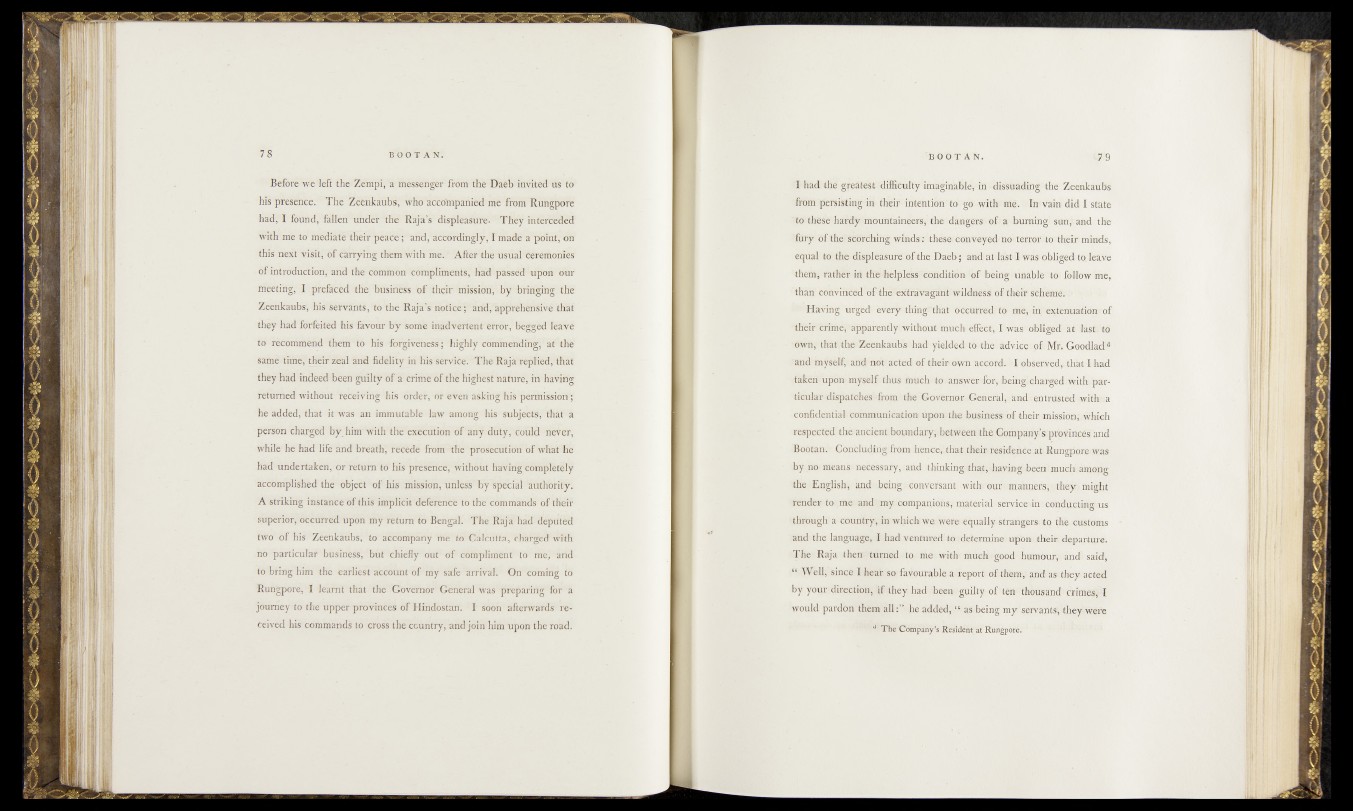
Before we left the Zëntpï, a messenger from the Daeb invited ùs to-
his presence. The ZeèhfeâuBs’l who'accompanied me from Rühgpdtb
hâd, I found, fallen' under th^Rajâ s displeasure. They ihterëödé'd
with me to mediate their peace ; and, accordingly, I made aJgSÉgfpR
this' next visit, of c&nymg them with me>^ Affër thè usml dëréifionies
of introduction, and the common compliments, had passed upon our
meeting, I prefaced the büsiïfes ù f ithgir mission, by bringing the
Zeenkaubs, his servants, to the Raja’s notice; arid, ‘apjhêhètiïivëthai
they had forfeited his favour by some inadvertent error, Begged ^fëâlké
to recommend them to his forgiveness ; highly chriunmidfT^; ?aitr’the'
same thrie, their zeal and fidelity in his service. The Raja^epKed,1 that
they hâd ibdeetTbeen guilty ôFa crime óf the highest nature, in havih’g
returned without receiving his order, or even asking his permission’;
he added, that it vras an immutable law among his subjects; that â
person charged by'him- with- the execution of 'ànytdftydolfitt
while he had life and breath, recede from the prosecutiotf bf wftriFfië
had undertaken, or return to his presence, without ha'^tóg^BSpfétël^
accomplished the object of his mission, unless by special authority,
A striking instance of this implicit deference to the commands of their
superior, occurred upon my return to Bengal. The Raja had deputed
two of firs Zeenkaubs, to accompany trie to Calcutta, charged with
no particular business, but chiefly out of compliment to me, arid
to bring him the earliest account of my safe arrival. On coming to
Rungpore, I learnt that the Governor General was preparing for a
journey to the upper provinces of Hindostan. I soon afterwards received
his commands to cross the country, and join him upon the rokd.
H had the gfe®i&PdifficUlty*iM#giMy^le^M'*&asSMdiftg‘thd' Z'efeiMribs
from persisting/ifi thtiiKintenaomtcfegtiS^i#lS*®f5- ^Ih*Vs®iMicL J state
’ to thesfe'hard^^biMfaMiorSf'ffli^5daiftgem! oF’^buEningi|^»|arid):the
dni^'nFthe^scbrchihg wiridSidthesemo'nyey^iJOtt'erronito'.'.tlffeiri minds,
equal to the displeasure of the. I^^^?a#dta'|tia!St'-I wasfoMiig$tst|vfe&ve
rthem; ibtfifm id th^hoIple^s^Go^d-tfe^hd^f ' jolfew -me,
-t-h'dri1 fconvtrfced1'o‘f thd?e3f#^ag®^'vtildnes®
■Shjl'Havih^drged' eveiy thmg^lumtfcunnAft to nfe-, inth^kiiMtifironstof
"their errmep apparently RwaStt#ii'gdd^^Miastri%o
own, that the Zeenkaubs had \iddld.to.<olac^dVe^,ofe Mr. GoodladP
fand iny Stethyandmod acted &f thmi*m^.^^gd^Ii^ii#e,di6Whtfkshajd
•taken uponimyself thus much^o" answer >ferdM^igfefaaEgedtmitb®|aar-
ticular dispatches fromah'e'lGovemoE.GEfflefalV-jb^Sentrdsted-xWifhsfe
momldmttfel communication» laponrthe busamessinf die^nf^inn^mfcieh
icspected the ancierrt-bonndar) j between- theGoritparfyislpipVimsed and
•Bootaiw GoncludiriglfromiheriotedJh'at t‘heDaresiid|niei,ati Rywgj^aEsjSfcas
by nofmeanssnecessary, and t<Mnking4thaj,»ha5dngi;beCm^muohtiam(M^
*ftie English, and-.-being ^dtovtefsarit; withV'm^JMaSmferS^iir^i might
render-to^me and'1 my. companions.-, matari rAdo-forife ma
through'a country, intwhicbwevWete^^ualLystrarigerss'tq ®b'Cttofcas
and the languageT-had ventured’tcstdSterminesiupbmMiteiik'departure.
-The Raja them turned to; r&exwith' muol#goad-mumbum>‘fedS said,
“ Well, since I hem. soTavourablfe. a-rep'orfe ci&tkemy andi^sSft-lrej&aGfcnd
by ygpt direction, ’if they had 'beeripgniky of' t^®k'thousand3 drmidsf-I
would pardon them all:" he added,“ as-being‘my^servantsptheyiwbre
..'" Tn#,CMm^ny%''Rtidd&v®